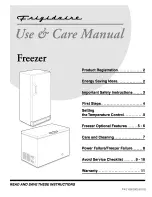
Installation
Cooling liquid
Before filling with fluid this cooler should be unplugged and isolated from any electrical supply. Be careful not to spill,
wipe up any splashes fluid straight away.
We strongly recommend BTC-20 NF. This lubricates the pump correctly & protects against freezing of the fluid down to
-20C. Do not use organic acid technology (OAT) or other types of automotive antifreeze it can damage the pump.
The cooler tank should be filled to the top of the inspection window and no more & kept at that level in use. We recom-
mend draining & refilling the system every 12 months to ensure correct lubrication, frost protection & long lifespan.
Plumbing etc
The inlet and outlet fittings are marked on the cooler, we recommend using 6 or 8mm PVC hose for connections to
these. Rubber hoses are not recommended as these can perish and cause blockages etc. Ensure all fitting are tight
and do not leak. When fitting this unit onto older machines & hoses its important to note that poor internal condition of
hoses & in particular rubber hoses can cause rubber particles to detach & subsequently contaminate the new cooling
system & pump. In some circumstances this can cause pump blockage. In addition old cooling pipes etc should be
flushed out prior to connecting the new water cooler
Electrical
This machine must be connected to the electricity supply by a competent person
Connect the input flex to a suitable supply. This supply may be a separate supply or possibly picked up from within the
machine make sure this supply voltage matches the voltage model of the cooler. If this supply is picked up from within
the welding machine ensure that there is sufficient capacity available to supply the cooler otherwise the welding ma-
chine may be damaged.
Ensure the green/yellow wire is connected to the earth terminal in the mains plug or a good earth point in the machine
this applies to all models & is the most important connection. The other two are normally blue & brown wires which
must be connected to the appropriate voltage, on 230V coolers the brown should be the live connection & blue the
neutral, on 110V supplies polarity is not important. On 400V coolers the blue & brown are normally connected to any
two phases from a 3 phase supply. Ensure the supply to this water cooler is protected with a fuse, the value is stated
in the specifications above.
If a flow switch is fitted to this cooler it needs to be linked into the control circuits of the welding machine to disable the
welding set if water is not flowing. This flow switch is designed to switch only low voltage and low current, please see
the specification on the flow switch before fitting. Do not attempt to connect this switch to mains voltage.
If in doubt consult a qualified electrician.
Other
Wherever possible this unit should be fixed into position. There are 4 x M5 female threads on the underside of the
cooler inside the rubber feet for mounting purposes. If the cooler topples over there is a risk of electric shock.
Always run the cooler with the tank lid fitted securely.
Ensure none of the ventilation slots on the underside are obstructed, 35mm clearance all around the underside of the
base is required to allow sufficient airflow. The fan on the side panel should ideally have at minimum of 100mm clear-
ance from anything & ideally over 200mm otherwise cooling capacity will be reduced.
The pump motor is protected from a stall condition by an electronic device which prevents the motor from burning out.
This operates after between 15-45 seconds after a pump stall & overload is detected & will remain shut down until
input power is removed. To reset this wait for approx. 1 minute with power off.
For any application where there is a risk of expensive torch failure due to water flow failure or critical applications a
flow switch should be fitted to shut down the welding process in the event of a flow failure.
Summary of Contents for CT-1000
Page 2: ......
Page 7: ......
Page 8: ...CT 1000 LIQUID COOLING SYSTEM EXCLUSIVELY FOR MADE IN BRITAIN...


























